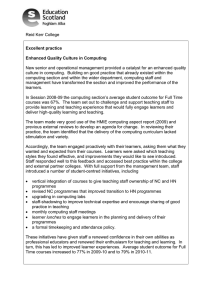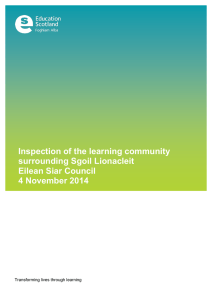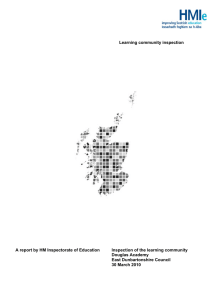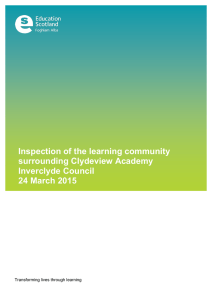Inspection of the learning community surrounding Coltness High School North Lanarkshire Council
advertisement
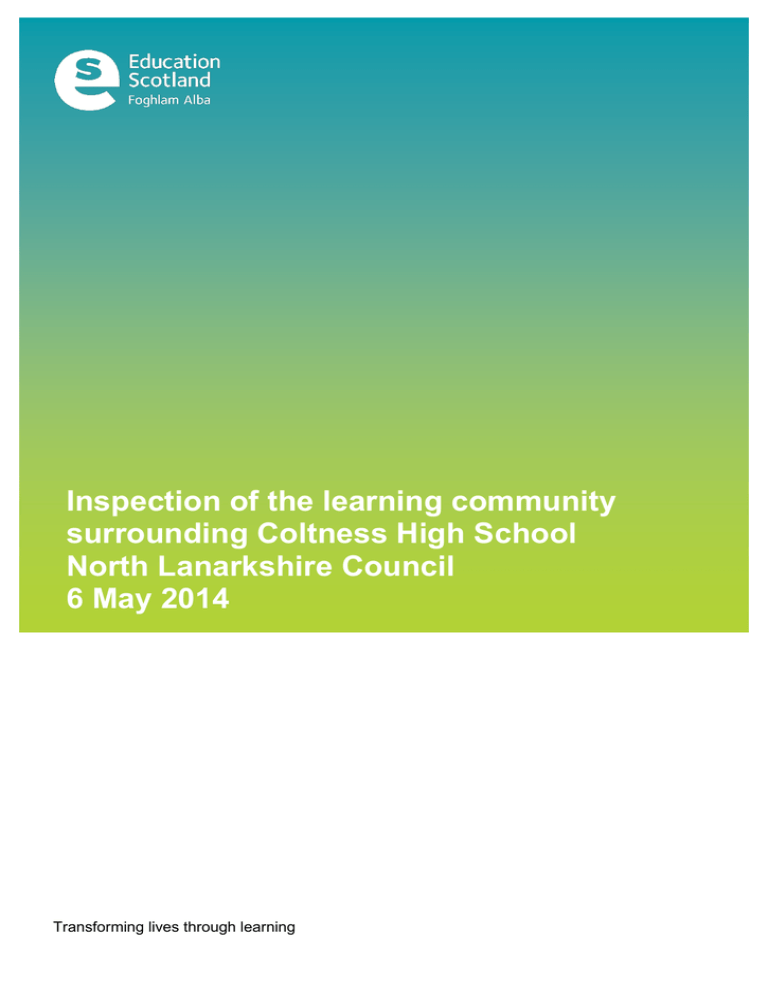
Inspection of the learning community surrounding Coltness High School North Lanarkshire Council 6 May 2014 Transforming lives through learning 1. Context Community learning and development (CLD) partners within the area of Coltness High School were inspected by Education Scotland during March 2014. During the visit Education Scotland staff talked to children, young people and adults. We worked closely with local and strategic CLD managers, CLD providers, paid staff and volunteers. We wanted to find out how well partners are improving the life chances of people living in the community through learning, building stronger more resilient communities and improving the quality of services and provision. We also looked at how well, paid staff and volunteers are developing their own practices and how well partners, including schools, are working together. We looked at some particular aspects of recent work which were identified by partners including: partnerships between CLD organisations and Coltness High School; approaches being taken to developing an audit of needs; and impacts on the health and wellbeing of learners and communities. 2. How well are partners improving learning, increasing life chances, promoting and securing wellbeing? Partners working in the learning community surrounding Coltness High School deliver high quality learning and leisure provision for local people of all ages. There is an emphasis on delivering programmes around health and wellbeing to meet identified needs. Thematic partnerships have clear plans with measures and targets attached with clear links to the Single Outcome Agreement (SOA). The North Lanarkshire SOA and Community Plan detail the key measures for success for all partners delivering services in North Lanarkshire. Annual targets are well used to measure progress. Staff and agencies have very good local knowledge and use this very effectively to signpost learners to the most relevant programmes. Many individual organisations including Reeltime Music and Made4U in ML2 use data very effectively to target specific programmes and individuals and to improve their performance. While there are good thematic examples of data sharing including in aspects of music and sport, partners need to continue to explore joint approaches to improve performance further. There is a good and increasing focus on accrediting learning where appropriate and possible. More than twenty S3 learners are currently undertaking their bronze Duke of Edinburgh’s Award which is an improving trend over the past three years. This is delivered in partnership with Made4U in ML2 who offer silver and gold award programmes for those who want to progress. Almost all adult learners are offered an opportunity to gain accreditation for their learning and uptake is improving. Regular evaluation by partners and participants of the Summer Chill transition programme is analysed and used to improve process and programmes. Targeting of young people at primary is being reviewed to ensure that those who need this programme are engaged. Dynamic Youth Awards are integrated into the event well, with 20 being attained in 2012 and 29 gained in 2013. 1 Levels of volunteering are high across the area and there is a strong desire in individuals to put something back and enable others to benefit. The Wishaw Action Group for Sport is led by a very active group of young adults who came through Community Sports Leadership Award programmes. They are determined to improve the infrastructures and uptake of sports locally and are well supported by Active Schools and other key staff. Young people involved in peer support, sports coaching and buddying programmes are very clear that they have a responsibility to share the benefits of their learning with younger learners. Learners of all ages clearly articulate the positive impacts of their learning. Very effective regular dialogue with learners enables them to consider the benefits of their learning so far and to look at next stages. Parents involved in family learning improve their self esteem, reduce isolation and boredom and engage in rewarding experiences. Partner agencies deliver high quality programmes in Coltness High School and there are strong links to community-based activity. Young people are clearly signposted and enabled to participate in relevant activities. Coltness Music project, Reeltime, Made4U in ML2 and Coltness High School music department work very well together to deliver programmes and experiences which enhance and deepen learning for young people. They target specific learners to enable them to gain from these programmes and courses as well as opening them up to those who have interests, skills or ambitions. Improving the coherence across 3-18 delivery would increase the impact on young people’s achievements. Adult learners engage in a wide range of programmes from literacy to sports and information and communications technology and these impact very positively on their lives. Volunteers with Lanarkshire Speakeasy Group assist people recently diagnosed with throat and head cancers using their own experience. Participants in the group have reduced levels of fear and isolation and increasing levels of resilience and self-help. Although there are good examples of guidance and signposting, there is room to improve the progression for adult learners. Strong volunteer led community groups deliver very effective local services which improve the lives of residents. Whizz Kids, Made4U in ML2, and Cambusnethan Miners Boxing Club clearly meet local needs and have a strong focus on learning and personal development. Newmains Community Development Trust is managed by a volunteer board of directors from the local community. The Board accessed support from CLD partner organisations and from national advice bodies to implement governance and best practice. They have successfully managed the tendering and procurement process and as a result have levered in £2.5 million of external funding for their local community. The experience has further developed local social capital and provided a community development asset based legacy. The Trust is now sharing their development journey and building community networks with other local communities. Community groups have representation on formal networks which enables effective partnership working and influence around service delivery at a local level. The Wishaw, Murdostoun and Fortissat consortium, hosted by Getting Better Together Shotts, has enabled organisations and service users in the learning community to 2 engage with, and influence, the Re-shaping Care for Older People agenda. This includes planning for sustainability and resilience through developing the capacity of local community groups to deliver services. The complex partnership and planning structures can make it difficult for some organisations to influence local decisions. Young people clearly have a strong voice in most youth centred organisations and services. It would be good to build on this and encourage their engagement in other local groups and networks to influence what happens in their local communities further. 3. How well are partners working together and improving the quality of services and provision? Staff and volunteers have a passion for the area and there are many good examples of them working together to deliver services. Partners delivering employability programmes share information and target their resources very well. They understand the needs of individuals and tailor their delivery to improve outcomes. Young people and adults have clear progression routes for employability programmes and support. Staff at the 16+ hub are looking very closely at the sustainability of positive destinations. Partners use a variety of methods to engage with and report progress to stakeholders with some making very effective use of social media. The Locality Planning Group are supporting agencies to work more effectively around Getting it right for every child (GIRFEC), early intervention, and youth offending diversionary activities through joint training and professional development. Staff value these opportunities which support them to work more effectively together. There is a strong emphasis on workforce development across agencies, with many staff and volunteers undertaking accredited programmes. The CLD service and Voluntary Action North Lanarkshire are working on developing baseline data to audit learning and community activities. Developing baseline data and auditing the services in the area is providing the CLD service with useful information. All partners involved in the delivery of learning need to consider their priorities and resources together on a more consistent basis and develop more robust and consistent self-evaluation across the partnership to improve outcomes. This inspection of learning and development in the learning community surrounding Coltness High School found the following key strengths. High levels of volunteering. The commitment and passion of staff and volunteers about making a difference in the area. Very effective CLD approaches and ethos in action. High quality and well-targeted learning opportunities. 3 We discussed with partners how they might continue to improve their work. This is what we agreed with them. Continue to improve collection and use of performance data and analysis across partners to better understand outcomes and secure improvement. Ensure the balance is right between supporting organisations and learning from them. Complete the audit of provision to understand the overall learning offer and how to meet needs. 4. What happens at the end of the inspection? We are satisfied with the overall quality of provision. We are confident that the learning community’s self-evaluation processes are leading to improvements. As a result, we will make no further evaluative visits in connection with this inspection. During the inspection, we identified an aspect of innovative practice which we would like to explore further. As a result we will work with the Coltness learning community and North Lanarkshire Council in order to record and share more widely the innovative practice. Maureen Mallon HM Inspector 6 May 2014 4 Additional inspection evidence, such as details of the quality indicator evaluations, for this learning community can be found on the Education Scotland website at http://www.educationscotland.gov.uk/inspectionandreview/reports/othersectors/com munitylearninganddevelopment/ColtnessHighSchoolLC.asp If you would like to receive this report in a different format, for example, in a translation you can contact the administration team on 01506 600381. If you want to give us feedback or make a complaint about our work, please contact us by telephone on 0141 282 5000, or e-mail: complaints@educationscotland.gsi.gov.uk or write to us, addressing your letter to The Complaints Manager, Denholm House, Almondvale Business Park, Livingston, EH54 6GA. Text phone users can contact us on 01506 600 236. This is a service for deaf users. Please do not use this number for voice calls as the line will not connect you to a member of staff. Crown Copyright 2014. Education Scotland 5
